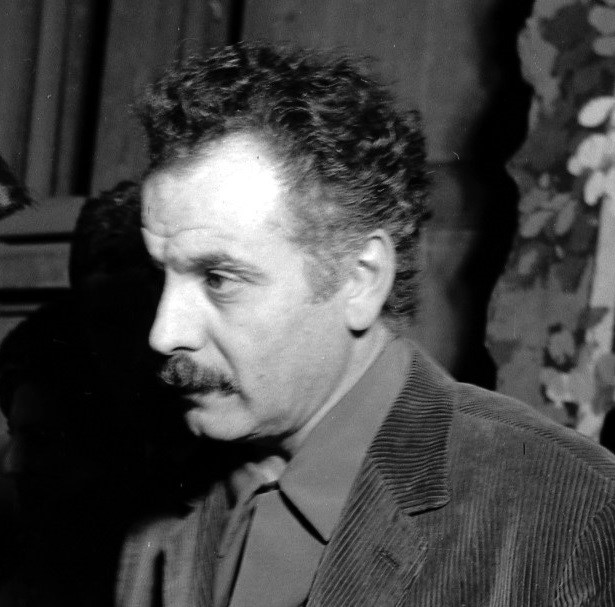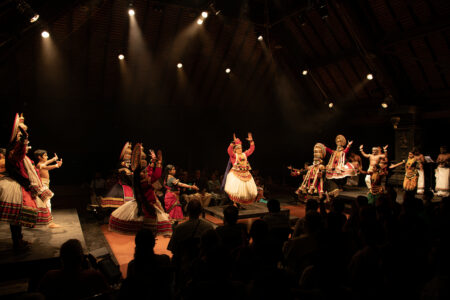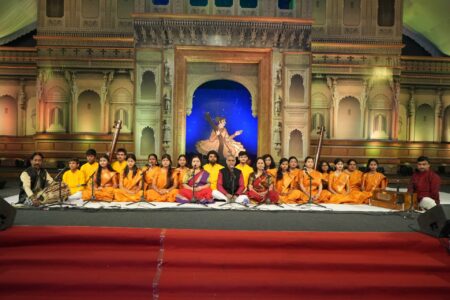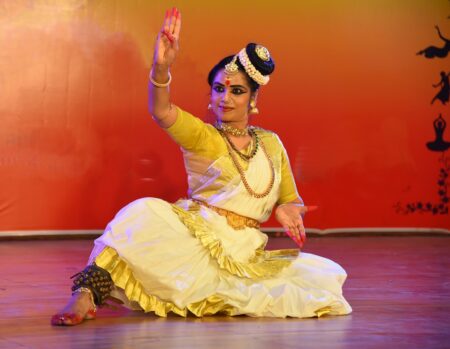Much of Carnatic literature circle around just three themes; praising, complaints or requests to God. Yet if I am asked whether music or lyrics are more important to the system, I’d say each deserves total importance.
Being locked down at home indefinitely for months, one gets a lot of time to introspect, evaluate one’s choices, try and correct one’s mistakes and count one’s blessings. One of the greatest blessings in my life has been the association with people who are older, wiser and more experienced. I have always preferred to read rather than write, listen rather than talk. When one is a good listener, people generally open up and reveal a lot of precious nuggets of information. One can benefit from them if put to use the right way.
During the mid-1990s, I remember a long conversation I had with TR Subramaniam (TRS). Among the many things the legendary musician told me included “Pallavi singing does not require tension…only attention!”.
Then came an interesting anecdote. After his first concert in Andhra Pradesh, when he sang mostly Telugu songs by Tyagaraja, the members of the audience crowded around him, felicitated him and said “Your concert was so brilliant! We have some songs here that have exactly the same tunes as most of the songs you sang! The only difference is that their lyrics are in Telugu!” Prof TRS decided then and there that he would employ a tutor and teach himself Telugu properly, which he did! I have encountered him several times in the house of my Telugu-speaking guru M Balamuralikrishna. Their conversation would inevitably be in Telugu!
The overarching Tyagaraja
If we take the song menu of 100 random concerts by various musicians from the past and present, we find that the maximum number of compositions featured would be that of Tyagaraja, most of which would be in Telugu. The second most sung would be that of the immortal Muthuswami Dikshitar, which are mostly in Sanskrit. For me, as a Carnatic music student living in Thiruvananthapuram during the 1980s, there was not much of an opportunity to learn the word-by-word meanings of songs in Telugu or Kannada, though I was acquainted with people who knew Tamil and Sanskrit. But now the situation has changed drastically and for the better!
There are amazing sites like these; thyagaraja-vaibhavam, Guru Guha Vaibhavam, Swathi Thirunnal Sangeetha Sabha, translationsofsomesongsofcarnticmusic which give the lyrics and meanings of so many songs; both popular and rare.
I have always loved music above most other things. Because of this, the lyrics or their meanings never mattered to me at all, for years and years. I would relish listening to a Greek or Persian song, as much as I would savour a Hindi song sung by Kishore Kumar or an Italian Operatic Aria sung by Caruso. The first time a well-meaning friend suggested to me that it might be a good idea if I were to find out the proper lyrics and the meanings of the songs that I sang, way back in 1990, I argued vehemently and said that it was only music that mattered. And if one wanted to enjoy lyrics, one should go and read poetry!
Lessons from French studies
By sheer good fortune, I started to study French. I got exposed to the lyrical brilliance of legends like Jacques Brel from Belgium and Georges Brassens from France. Their songs cover literally every emotion possible, from the sublime to the tender to the passionate to the philosophical to the truly naughty. Here is a selection of songs by Brassens with English translations, which you are welcome to explore, if you are not the type who gets shocked or offended easily.
It was while relishing these brilliant poems in an alien language like French that I gradually started feeling guilty about the fact that I had absolutely no idea about what I was singing myself! My first step to rectify this rather pathetic situation was to start going through the lyrics and word-by-word meanings of Tyagaraja kritis in the amazing Malayalam book, Tyagaraja Sudha, by KPS Menon. It was thoughtfully gifted to me by one of the many brothers of my formidable great-grandmother, Maharani Sethu Parvathy Bayi. When he gave me the book, he told me in 1984, “It is horrible to listen to Carnatic music, except when they sing alapana and swaras because these people mangle the lyrics mercilessly! You take care not to do that, okay?” The book remained more or less unopened until 1990. But I am so grateful that I did open it at least then, though it was thanks to Brel and Brassens.
Recurrent themes
Undeniably, much of the lyrics circle around three themes. One, a generous amount of praise for the chosen God whom the composer sings to/about. Two, a bout of complaints that He or She was ignoring the poor composer. Three, a request for health, wealth, peace, prosperity, victory, fulfilment and salvation.
It is also a fact that if we take the trouble to sensitize ourselves to the lyrical beauty and wealth of these songs, they most definitely do reveal their charms and do have much to offer. Apart from presentations like this where I had the privilege of sharing the stage with the incomparable TV Gopalakrishnan and to give a few glimpses about the lyrical wealth that can be found within the Carnatic repertoire.
I have made a few home videos, throwing light on the lyrical richness of popular compositions like Endaro Mahanubhavulu and Bhavayami raghuramam which, many people seem to find quite useful.
Music or lyrics?
Most of us know that there is good and bad to be found in almost everything. It would be a waste of time to find faults with song renditions by other singers, past and present. It would be equally silly to follow anyone musician blindly and embrace everything they did or do, without applying one’s own mind, at least a little bit. In their efforts to popularize Carnatic music and bring it closer “to the masses”, people do a variety of things like making music videos set in outlandish locations, mix one genre of music with another, package it in different formats, with unusual costumes and unusual instruments and so on.
Taking care to refine and develop one’s voice and paying attention to the lyrics, their meaning and the clarity of one’s enunciation, yield rich dividends, even while one remains solidly within the boundaries of what one normally recognizes as “classical music.” My answer to the question “Which is more important? Music or lyrics?” would be “Both! And not fifty-fifty either. Each of them deserves 100 per cent importance.” One simply has to put in that extra effort, first to understand the lyrics oneself and then to share their sweetness and their wealth, with one’s listeners.






1 Comment
As an ardent lover of carnatic music for over 50 years, I must admit that lyrics have never meant anything to me. One, I do not know telugu or sanskrit and two, even if the krithi were to be in tamizh or Malayalam , I make no effort to understand them. I love this form of music for the sheer awesomeness of the lovely ragams the krithis are couched in.